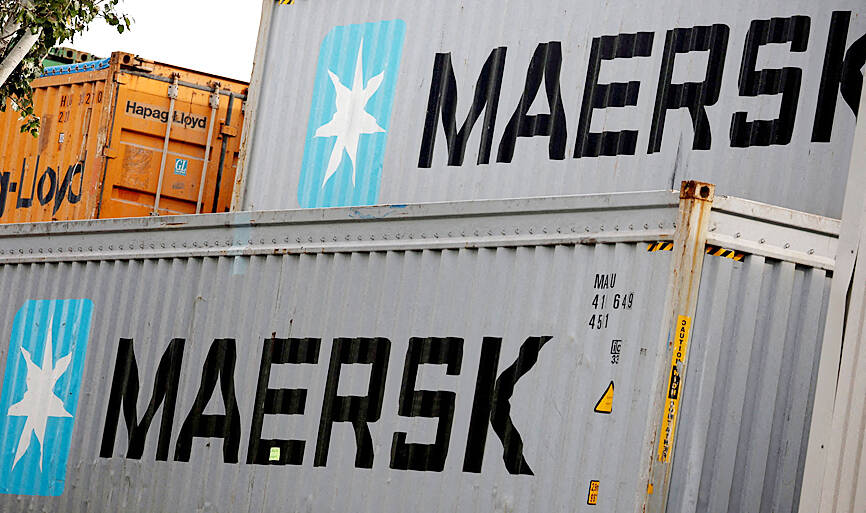Shipping giant A.P. Moller-Maersk A/S reported yesterday a massive drop in net profit for last year and warned of “uncertainty” for this year due to Yemeni rebel attacks on vessels in the Red Sea.
An oversupply of container shipping last year caused prices to drop after they had soared in 2022 due to capacity shortages amid high demand following the end of COVID-19 pandemic restrictions, the Danish group said.
“The high demand eventually started to normalize as congestions eased, and consumer demand declined leading to an inventory overhang,” Maersk said in its annual earnings report.

Photo: REUTERS
This “correction” resulted “in rapid and steep declines in shipped volumes and rates starting” at the end of the third quarter of 2022, it added.
Maersk said its net profit reached US$3.8 billion last year, slightly more than forecast by analysts but down sharply from the US$29.2 billion logged in 2022.
Its revenue was also slightly above forecasts, reaching US$51 billion compared to US$81.5 billion the previous year.
The “oversupply challenges” in the maritime shipping industry are expected to “materialize fully” over the course of this year, Maersk said.
The group lowered its forecast for its core profit for this year — earnings before interest, tax, depreciation and amortization — to a range of between US$1 billion and US$6 billion.
“High uncertainty remains around the duration and degree of the Red Sea disruption with the duration from one quarter to full year reflected in the guidance range,” Maersk said.
Maersk's stock price sank more than 13 percent on the Copenhagen stock exchange after the release of the earnings report, which also included the announcement of the suspension of its share buyback plan.
Chairman Robert Maersk Uggla and CEO Vincent Clerc said in the earnings report that "2023 ended with multiple distressing attacks on cargo ships in the Red Sea and the Gulf of Aden".
They noted that two of the company's ships had been targeted.
"We are horrified by the escalation of this unfortunate conflict," they said.
Maersk and other shipping companies have decided to redirect shifts away from the Red Sea, making them take the longer and costlier route around the southern tip of Africa.
The Red Sea usually carries about 12 percent of global maritime trade.
Yemen’s Iran-backed Huthi rebels have targeted ships crossing the Red Sea since last year, saying their campaign was in solidarity with Palestinians in the war between Israel and Hamas.
"While the Red Sea crisis has caused immediate capacity constraints and a temporary increase in rates, eventually the oversupply in shipping capacity will lead to price pressure and impact our results," Clerc said.
Maersk also announced it would spin off its towage business, Svitzer, as a separate listed company.

BYPASSING CHINA TARIFFS: In the first five months of this year, Foxconn sent US$4.4bn of iPhones to the US from India, compared with US$3.7bn in the whole of last year Nearly all the iPhones exported by Foxconn Technology Group (富士康科技集團) from India went to the US between March and last month, customs data showed, far above last year’s average of 50 percent and a clear sign of Apple Inc’s efforts to bypass high US tariffs imposed on China. The numbers, being reported by Reuters for the first time, show that Apple has realigned its India exports to almost exclusively serve the US market, when previously the devices were more widely distributed to nations including the Netherlands and the Czech Republic. During March to last month, Foxconn, known as Hon Hai Precision Industry

Taiwan Semiconductor Manufacturing Co (TSMC, 台積電) and the University of Tokyo (UTokyo) yesterday announced the launch of the TSMC-UTokyo Lab to promote advanced semiconductor research, education and talent development. The lab is TSMC’s first laboratory collaboration with a university outside Taiwan, the company said in a statement. The lab would leverage “the extensive knowledge, experience, and creativity” of both institutions, the company said. It is located in the Asano Section of UTokyo’s Hongo, Tokyo, campus and would be managed by UTokyo faculty, guided by directors from UTokyo and TSMC, the company said. TSMC began working with UTokyo in 2019, resulting in 21 research projects,

Ashton Hall’s morning routine involves dunking his head in iced Saratoga Spring Water. For the company that sells the bottled water — Hall’s brand of choice for drinking, brushing his teeth and submerging himself — that is fantastic news. “We’re so thankful to this incredible fitness influencer called Ashton Hall,” Saratoga owner Primo Brands Corp’s CEO Robbert Rietbroek said on an earnings call after Hall’s morning routine video went viral. “He really helped put our brand on the map.” Primo Brands, which was not affiliated with Hall when he made his video, is among the increasing number of companies benefiting from influencer

Quanta Computer Inc (廣達) chairman Barry Lam (林百里) yesterday expressed a downbeat view about the prospects of humanoid robots, given high manufacturing costs and a lack of target customers. Despite rising demand and high expectations for humanoid robots, high research-and-development costs and uncertain profitability remain major concerns, Lam told reporters following the company’s annual shareholders’ meeting in Taoyuan. “Since it seems a bit unworthy to use such high-cost robots to do household chores, I believe robots designed for specific purposes would be more valuable and present a better business opportunity,” Lam said Instead of investing in humanoid robots, Quanta has opted to invest